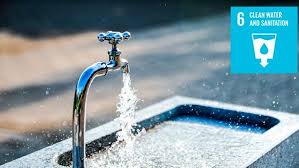The Importance of Sustainable Development Goal 6
Sustainable Development Goal 6 (SDG 6) is a critical component of the United Nations’ 2030 Agenda for Sustainable Development. SDG 6 focuses on ensuring availability and sustainable management of water and sanitation for all. This goal recognizes the essential role that access to clean water and sanitation plays in eradicating poverty, protecting public health, and promoting sustainable development worldwide.
Key Objectives of SDG 6:
- Ensure universal access to safe and affordable drinking water for all.
- Achieve access to adequate and equitable sanitation and hygiene for all.
- Improve water quality by reducing pollution, eliminating dumping, and minimizing the release of hazardous chemicals.
- Substantially increase water-use efficiency across all sectors.
- Protect and restore water-related ecosystems, including mountains, forests, wetlands, rivers, aquifers, and lakes.
The Impact of Achieving SDG 6:
By achieving the targets set out in SDG 6, significant progress can be made towards improving the lives of billions of people around the world. Access to clean water and sanitation is fundamental to human dignity and well-being. It not only reduces the risk of waterborne diseases but also enhances economic productivity, educational opportunities, gender equality, and environmental sustainability.
Challenges Ahead:
Despite progress in some regions, many challenges remain in achieving SDG 6 by 2030. Issues such as water scarcity, inadequate sanitation facilities, pollution of freshwater sources, climate change impacts on water resources, and lack of funding for infrastructure development pose significant obstacles to reaching this goal. Collaboration among governments, organizations, communities, and individuals is crucial to overcoming these challenges.
Call to Action:
As global citizens, we all have a role to play in advancing SDG 6. Whether through advocating for better water management policies, supporting sustainable water initiatives in our communities, or conserving water resources in our daily lives, each action contributes to the collective effort towards achieving universal access to clean water and sanitation. Let us work together to ensure a more sustainable future for generations to come.
Understanding the Importance and Goals of SDG 6: Clean Water and Sanitation
- Why is SDG 6 the most important?
- Why clean water and sanitation is important?
- Will SDG 6 be achieved?
- What is the main goal of SDG 6?
Why is SDG 6 the most important?
SDG 6, which focuses on ensuring access to clean water and sanitation for all, is often regarded as the most important Sustainable Development Goal due to its fundamental impact on human health, well-being, and overall sustainable development. Access to clean water is essential for basic hygiene, preventing waterborne diseases, and promoting overall public health. Similarly, adequate sanitation facilities are crucial for maintaining dignity, reducing environmental pollution, and improving quality of life. By addressing the challenges related to water and sanitation, SDG 6 not only directly improves the lives of individuals but also contributes to broader goals such as poverty reduction, gender equality, and environmental sustainability. Prioritizing SDG 6 is vital for building a more equitable and sustainable future for all.
Why clean water and sanitation is important?
Access to clean water and sanitation is crucial for human health, dignity, and overall well-being. Clean water is essential for drinking, cooking, and personal hygiene, while proper sanitation facilities help prevent the spread of diseases and maintain public health. Lack of access to clean water and sanitation disproportionately affects vulnerable populations, including women, children, and those living in poverty. By ensuring universal access to clean water and sanitation, we can reduce the prevalence of waterborne illnesses, improve quality of life, promote gender equality, enhance economic opportunities, and protect the environment. Investing in clean water and sanitation infrastructure is not only a matter of human rights but also a key component of sustainable development efforts worldwide.
Will SDG 6 be achieved?
The achievement of Sustainable Development Goal 6 (SDG 6) by 2030 remains a complex and challenging task. While significant progress has been made in improving access to clean water and sanitation worldwide, many regions still face obstacles such as water scarcity, inadequate infrastructure, and environmental degradation. Achieving SDG 6 requires sustained commitment, innovative solutions, and collaboration among governments, organizations, and communities. While the goal may be ambitious, with concerted efforts and resources directed towards water management and sanitation initiatives, there is potential for SDG 6 to be achieved. Continuous monitoring, evaluation, and adaptation of strategies will be essential to ensure progress towards universal access to safe water and sanitation for all.
What is the main goal of SDG 6?
The main goal of Sustainable Development Goal 6 (SDG 6) is to ensure universal access to safe and affordable drinking water and sanitation for all. By addressing the challenges related to water scarcity, inadequate sanitation facilities, water pollution, and unsustainable water management practices, SDG 6 aims to improve public health, promote economic development, enhance environmental sustainability, and advance social equity. Achieving this goal is crucial for eradicating poverty, reducing inequalities, and building a more resilient and sustainable future for communities worldwide.

